外研版 八年级下 Module 9 Unit 1 Could I ask if you've mentioned this to her? 课件 (共32张PPT)
文档属性
| 名称 | 外研版 八年级下 Module 9 Unit 1 Could I ask if you've mentioned this to her? 课件 (共32张PPT) |  | |
| 格式 | pptx | ||
| 文件大小 | 163.0KB | ||
| 资源类型 | 教案 | ||
| 版本资源 | 外研版 | ||
| 科目 | 英语 | ||
| 更新时间 | 2022-07-20 17:47:39 | ||
图片预览

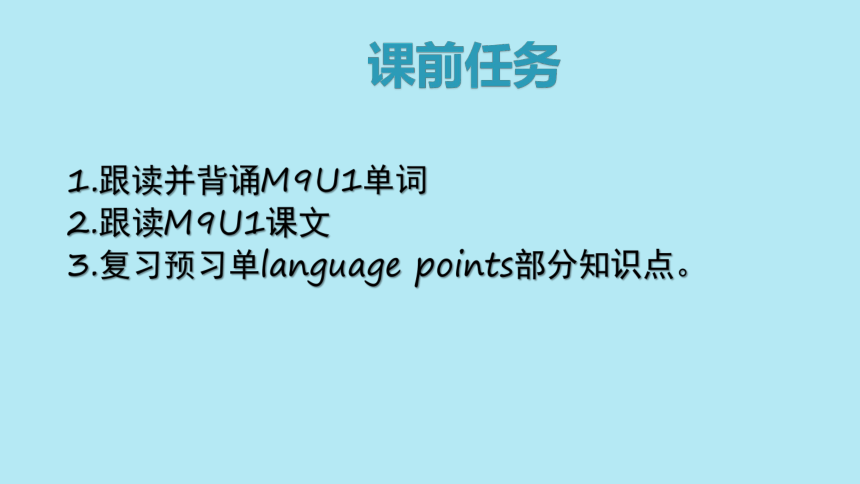
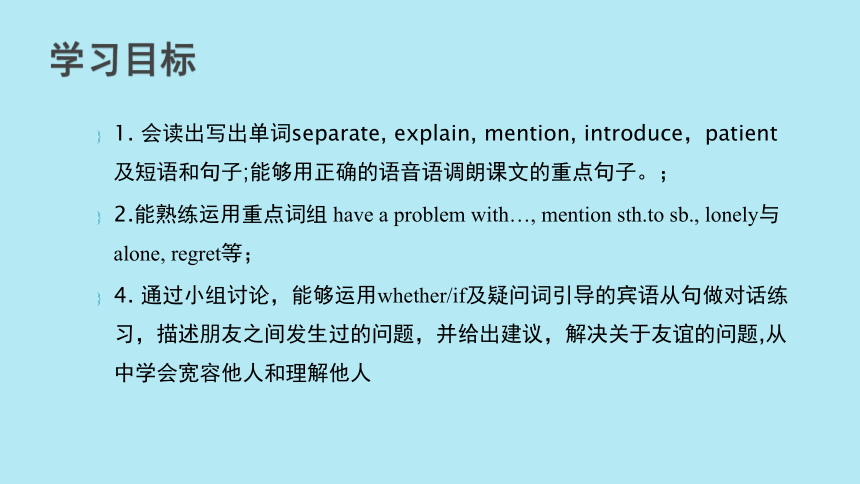


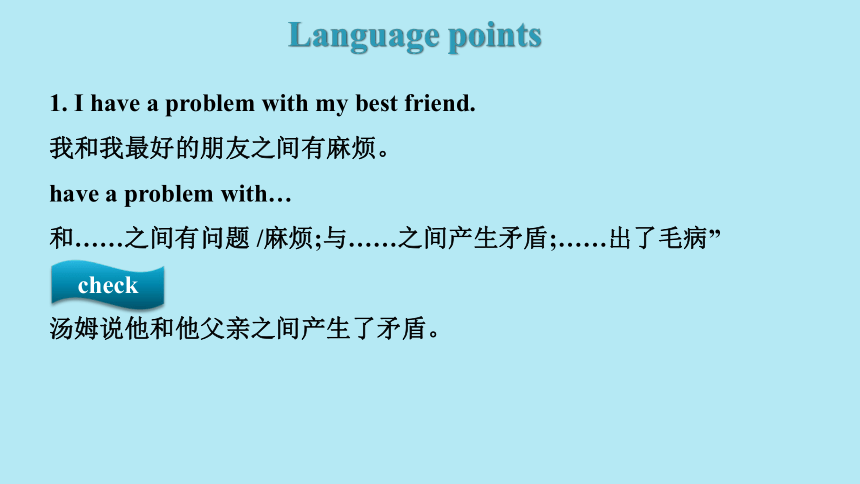
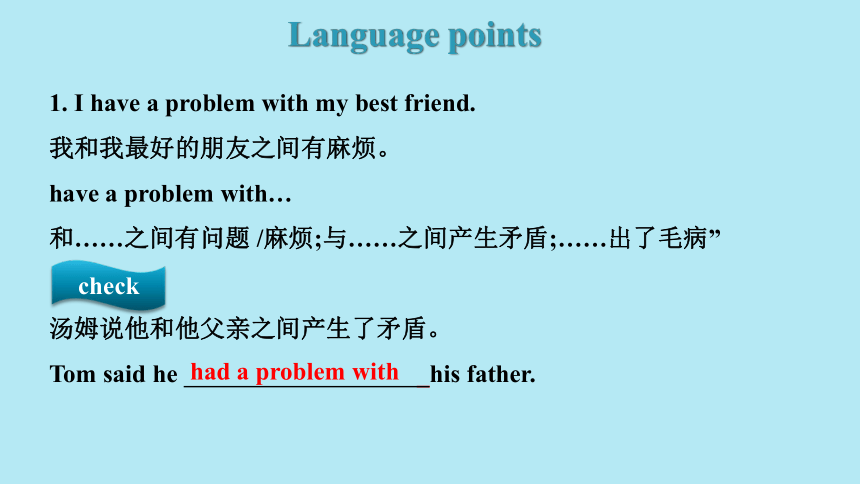
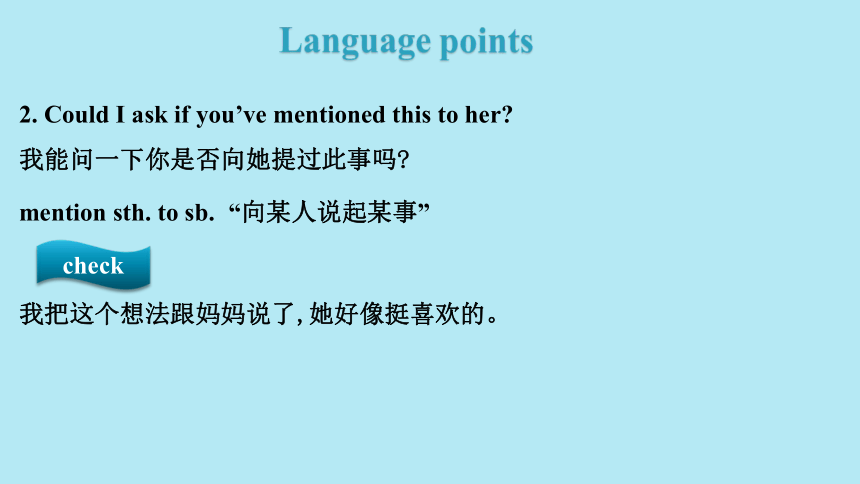
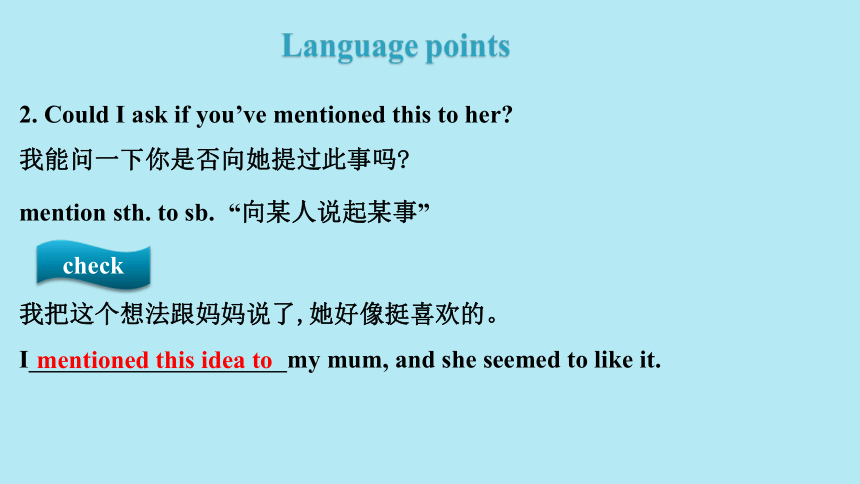

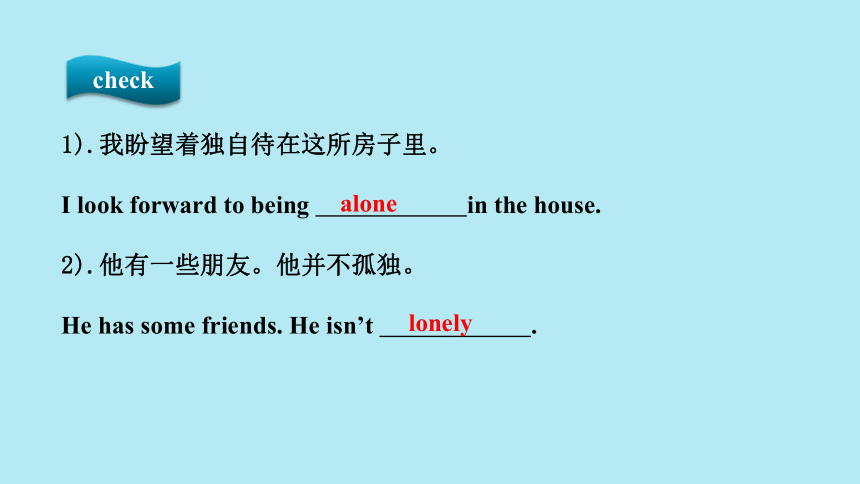

文档简介
(共32张PPT)
Module 9 Friendship
Unit 1 Could I ask if you’ve mentioned this to her
1.跟读并背诵M9U1单词
2.跟读M9U1课文
3.复习预习单language points部分知识点。
课前任务
1. 会读出写出单词separate, explain, mention, introduce,patient及短语和句子;能够用正确的语音语调朗课文的重点句子。;
2.能熟练运用重点词组 have a problem with…, mention sth.to sb., lonely与 alone, regret等;
4. 通过小组讨论,能够运用whether/if及疑问词引导的宾语从句做对话练习,描述朋友之间发生过的问题,并给出建议,解决关于友谊的问题,从中学会宽容他人和理解他人
学习目标
1.遗憾做某事 2.和...有问题
3.保持联系 4.向...介绍...
5.鼓励某人做某事 6.向某人解释
7.对……有耐心的 8.使分开
sentences
1.我和我的好朋友之间出了点问题。
2.上学期我们分开了,去了不同的学校,但是我们保持着联系。
3. 试着了解下,看她是否会因为没有你而感到孤独。
4.所以你对于她要有耐心,向她解释她也可以和你的其他朋友交朋友。
phrases
1.遗憾做某事 regret doing
2.和...有问题 have a problem with sb.
3.保持联系 stay in touch
4.向...介绍... introduce...to...
5.鼓励某人做某事 encourage sb.to do
6.向某人解释 explain to sb.
7.对……有耐心的 be patient with
8.使分开 get separated
1.我和我的好朋友之间出了点问题。
I have a problem with my best friend.
2.上学期我们分开了,去了不同的学校,但是我们保持着联系。
We got separated when we went to different schools last term, but we stayed in touch.
3. 试着了解下,看她是否会因为没有你而感到孤独。
Try to find out whether she feels lonely without you.
4.所以你对于她要有耐心,向她解释她也可以和你的其他朋友交朋友。
So be patient with her and explain to her that she can make friends with your other friends too.
Language points
1. I have a problem with my best friend.
我和我最好的朋友之间有麻烦。
have a problem with…
和……之间有问题 /麻烦;与……之间产生矛盾;……出了毛病”
汤姆说他和他父亲之间产生了矛盾。
check
Language points
1. I have a problem with my best friend.
我和我最好的朋友之间有麻烦。
have a problem with…
和……之间有问题 /麻烦;与……之间产生矛盾;……出了毛病”
汤姆说他和他父亲之间产生了矛盾。
Tom said he _his father.
had a problem with
check
2. Could I ask if you’ve mentioned this to her
我能问一下你是否向她提过此事吗
mention sth. to sb. “向某人说起某事”
我把这个想法跟妈妈说了,她好像挺喜欢的。
Language points
check
2. Could I ask if you’ve mentioned this to her
我能问一下你是否向她提过此事吗
mention sth. to sb. “向某人说起某事”
我把这个想法跟妈妈说了,她好像挺喜欢的。
I my mum, and she seemed to like it.
mentioned this idea to
Language points
check
3. Try to find out whether she feels lonely without you.
尽量弄清楚没有你她是否会感到孤独。
辨析:lonely与 alone
lonely 作adj.,意为 “孤独的,寂寞的”,在句中充当定语或表语。a lonely island(一个孤岛); feel lonely(感到孤独)表示主观上孤独、寂寞,带有感彩。
alone 作adj.时,意为 “单独的,独自的”,充当表语或宾语补足语,如:be alone(单独一人),leave sb. alone(把某人单独留下);作adv.时,意为 “单独地;独自地”,在句中作状语。如:live alone(单独居住)强调客观上的孤独,不带感彩。
1).我盼望着独自待在这所房子里。
I look forward to being in the house.
2).他有一些朋友。他并不孤独。
He has some friends. He isn’t .
alone
lonely
check
4. I’m sure she regrets hurting you.
我相信她后悔伤害了你。
regret vt. “懊悔;遗憾”其后接名词、代词、动名词或 that从句作宾语。
① regret+n./pron./v.ing
② I/We regret to inform you/to tell you/to say+that宾语从句
(用于通知坏消息时)我/我们很遗憾地通知你/告诉你/说……
1). 我很遗憾在如此重要的时刻不能和你在一起。
2). 我很高兴你和我们一起来了,你不会后悔的。
3). 我不后悔搬到中国来。
4). 我很遗憾地说没有给你带来好消息。
check
1). 我很遗憾在如此重要的时刻不能和你在一起。
I regret that I will not be with you on such an important occasion.
2). 我很高兴你和我们一起来了,你不会后悔的。
3). 我不后悔搬到中国来。
4). 我很遗憾地说没有给你带来好消息。
check
1). 我很遗憾在如此重要的时刻不能和你在一起。
I regret that I will not be with you on such an important occasion.
2). 我很高兴你和我们一起来了,你不会后悔的。
I’m glad you’re coming with us. You won’t regret it.
3). 我不后悔搬到中国来。
4). 我很遗憾地说没有给你带来好消息。
check
1). 我很遗憾在如此重要的时刻不能和你在一起。
I regret that I will not be with you on such an important occasion.
2). 我很高兴你和我们一起来了,你不会后悔的。
I’m glad you’re coming with us. You won’t regret it.
3). 我不后悔搬到中国来。
I don’t regret moving to China.
4). 我很遗憾地说没有给你带来好消息。
check
1). 我很遗憾在如此重要的时刻不能和你在一起。
I regret that I will not be with you on such an important occasion.
2). 我很高兴你和我们一起来了,你不会后悔的。
I’m glad you’re coming with us. You won’t regret it.
3). 我不后悔搬到中国来。
I don’t regret moving to China.
4). 我很遗憾地说没有给你带来好消息。
I regret to say that I have no good news for you.
check
5. Yes, but she refused to listen.
但是他不听。
refuse vt.&vi.
refuse to do 拒绝去做某事
1). 我拒绝买那些东西。
2). 我拒绝了他的邀请。
check
5. Yes, but she refused to listen.
但是他不听。
refuse vt.&vi.
refuse to do 拒绝去做某事
1). 我拒绝买那些东西。
I refuse to buy those things.
2). 我拒绝了他的邀请。
check
5. Yes, but she refused to listen.
但是他不听。
refuse vt.&vi.
refuse to do 拒绝去做某事
1). 我拒绝买那些东西。
I refuse to buy those things.
2). 我拒绝了他的邀请。
I refused his invitation.
check
6. So be patient with her and explain to her that she can make friends with your other friends too.
所以你要对她有耐心,要向她解释她也可以和你的其他朋友交朋友。
① be patient with... 对...有耐心
be strict with sb. 对某人严格
② explain sth. (to sb.) (向某人)解释某事
explain+that宾语从句
explain to sb.+疑问词+to do.
1). 王老师对她的学生很有耐心。
2). 父母要对孩子严格。
3). 你能跟我们讲一下游戏规则吗?
4). 你能跟我们讲一下怎样使用这台电脑吗?
check
6. So be patient with her and explain to her that she can make friends with your other friends too.
所以你要对她有耐心,要向她解释她也可以和你的其他朋友交朋友。
① be patient with... 对...有耐心
be strict with sb. 对某人严格
② explain sth. (to sb.) (向某人)解释某事
explain+that宾语从句
explain to sb.+疑问词+to do.
1). 王老师对她的学生很有耐心。Miss Wang is patient with her students.
2). 父母要对孩子严格。
3). 你能跟我们讲一下游戏规则吗?
4). 你能跟我们讲一下怎样使用这台电脑吗?
check
6. So be patient with her and explain to her that she can make friends with your other friends too.
所以你要对她有耐心,要向她解释她也可以和你的其他朋友交朋友。
① be patient with... 对...有耐心
be strict with sb. 对某人严格
② explain sth. (to sb.) (向某人)解释某事
explain+that宾语从句
explain to sb.+疑问词+to do.
1). 王老师对她的学生很有耐心。Miss Wang is patient with her students.
2). 父母要对孩子严格。Parents must be strict with children.
3). 你能跟我们讲一下游戏规则吗?
4). 你能跟我们讲一下怎样使用这台电脑吗?
check
6. So be patient with her and explain to her that she can make friends with your other friends too.
所以你要对她有耐心,要向她解释她也可以和你的其他朋友交朋友。
① be patient with... 对...有耐心
be strict with sb. 对某人严格
② explain sth. (to sb.) (向某人)解释某事
explain+that宾语从句
explain to sb.+疑问词+to do.
1). 王老师对她的学生很有耐心。Miss Wang is patient with her students.
2). 父母要对孩子严格。Parents must be strict with children.
3). 你能跟我们讲一下游戏规则吗?Could you explain the rules of the game
4). 你能跟我们讲一下怎样使用这台电脑吗?
check
6. So be patient with her and explain to her that she can make friends with your other friends too.
所以你要对她有耐心,要向她解释她也可以和你的其他朋友交朋友。
① be patient with... 对...有耐心
be strict with sb. 对某人严格
② explain sth. (to sb.) (向某人)解释某事
explain+that宾语从句
explain to sb.+疑问词+to do.
1). 王老师对她的学生很有耐心。Miss Wang is patient with her students.
2). 父母要对孩子严格。Parents must be strict with children.
3). 你能跟我们讲一下游戏规则吗?Could you explain the rules of the game
4). 你能跟我们讲一下怎样使用这台电脑吗?Could you explain to us how to use the computer
check
7. Try to find out whether she feels lonely without you.
试着了解一下,她是否会因为没有你而感到孤独。
宾语从句三要素:
①引导词:that, 在句中无词汇意义, 只具有语法功能, 在从句中不能充当成分, 在多数情况下往往省略。
if/whether, 可以互换,在句子不做任何成分,但具有词汇意义,意思为“是否”,在句中不能省略。
②语序:陈述语序
③时态:主句为一般现在时,从句根据情况用各种时态;
主句为一般过去时,从句用过去的某种时态;
从句是客观真理,自然现象,公式定理,名言警句,用一般现在时。
只用whether的情况:
1)与 or not连用时
2)位于介词 之后
3)与to do 连用时
check
1.老师告诉我们地球围着太阳转。
2.我不知道她是否会来。
3.我不关心他是否帅气。
4.他想知道下周是否会待在这里。
check
1.老师告诉我们地球围着太阳转。
The teacher told us that the earth goes around the sun.
2.我不知道她是否会来。
3.我不关心他是否帅气。
4.他想知道下周是否会待在这里。
check
1.老师告诉我们地球围着太阳转。
The teacher told us that the earth goes around the sun.
2.我不知道她是否会来。
I don’t know whether he will come or not.
3.我不关心他是否帅气。
4.他想知道下周是否会待在这里。
check
1.老师告诉我们地球围着太阳转。
The teacher told us that the earth goes around the sun.
2.我不知道她是否会来。
I don’t know whether he will come or not.
3.我不关心他是否帅气。
I don’t care about whether he is handsome.
4.他想知道下周是否会待在这里。
check
1.老师告诉我们地球围着太阳转。
The teacher told us that the earth goes around the sun.
2.我不知道她是否会来。
I don’t know whether he will come or not.
3.我不关心他是否帅气。
I don’t care about whether he is handsome.
4.他想知道下周是否会待在这里。
He wondered whether to stay here the next week.
work in pairs:
疫情期间,因缺乏交流联系,很多同学与朋友之间出现了诸多问题,如何解决这些问题呢?2人合作完成汇报展示
完成方式:2人一组,根据句型提示,每人至少说出3个句子。有困难在讨论区求助。
Module 9 Friendship
Unit 1 Could I ask if you’ve mentioned this to her
1.跟读并背诵M9U1单词
2.跟读M9U1课文
3.复习预习单language points部分知识点。
课前任务
1. 会读出写出单词separate, explain, mention, introduce,patient及短语和句子;能够用正确的语音语调朗课文的重点句子。;
2.能熟练运用重点词组 have a problem with…, mention sth.to sb., lonely与 alone, regret等;
4. 通过小组讨论,能够运用whether/if及疑问词引导的宾语从句做对话练习,描述朋友之间发生过的问题,并给出建议,解决关于友谊的问题,从中学会宽容他人和理解他人
学习目标
1.遗憾做某事 2.和...有问题
3.保持联系 4.向...介绍...
5.鼓励某人做某事 6.向某人解释
7.对……有耐心的 8.使分开
sentences
1.我和我的好朋友之间出了点问题。
2.上学期我们分开了,去了不同的学校,但是我们保持着联系。
3. 试着了解下,看她是否会因为没有你而感到孤独。
4.所以你对于她要有耐心,向她解释她也可以和你的其他朋友交朋友。
phrases
1.遗憾做某事 regret doing
2.和...有问题 have a problem with sb.
3.保持联系 stay in touch
4.向...介绍... introduce...to...
5.鼓励某人做某事 encourage sb.to do
6.向某人解释 explain to sb.
7.对……有耐心的 be patient with
8.使分开 get separated
1.我和我的好朋友之间出了点问题。
I have a problem with my best friend.
2.上学期我们分开了,去了不同的学校,但是我们保持着联系。
We got separated when we went to different schools last term, but we stayed in touch.
3. 试着了解下,看她是否会因为没有你而感到孤独。
Try to find out whether she feels lonely without you.
4.所以你对于她要有耐心,向她解释她也可以和你的其他朋友交朋友。
So be patient with her and explain to her that she can make friends with your other friends too.
Language points
1. I have a problem with my best friend.
我和我最好的朋友之间有麻烦。
have a problem with…
和……之间有问题 /麻烦;与……之间产生矛盾;……出了毛病”
汤姆说他和他父亲之间产生了矛盾。
check
Language points
1. I have a problem with my best friend.
我和我最好的朋友之间有麻烦。
have a problem with…
和……之间有问题 /麻烦;与……之间产生矛盾;……出了毛病”
汤姆说他和他父亲之间产生了矛盾。
Tom said he _his father.
had a problem with
check
2. Could I ask if you’ve mentioned this to her
我能问一下你是否向她提过此事吗
mention sth. to sb. “向某人说起某事”
我把这个想法跟妈妈说了,她好像挺喜欢的。
Language points
check
2. Could I ask if you’ve mentioned this to her
我能问一下你是否向她提过此事吗
mention sth. to sb. “向某人说起某事”
我把这个想法跟妈妈说了,她好像挺喜欢的。
I my mum, and she seemed to like it.
mentioned this idea to
Language points
check
3. Try to find out whether she feels lonely without you.
尽量弄清楚没有你她是否会感到孤独。
辨析:lonely与 alone
lonely 作adj.,意为 “孤独的,寂寞的”,在句中充当定语或表语。a lonely island(一个孤岛); feel lonely(感到孤独)表示主观上孤独、寂寞,带有感彩。
alone 作adj.时,意为 “单独的,独自的”,充当表语或宾语补足语,如:be alone(单独一人),leave sb. alone(把某人单独留下);作adv.时,意为 “单独地;独自地”,在句中作状语。如:live alone(单独居住)强调客观上的孤独,不带感彩。
1).我盼望着独自待在这所房子里。
I look forward to being in the house.
2).他有一些朋友。他并不孤独。
He has some friends. He isn’t .
alone
lonely
check
4. I’m sure she regrets hurting you.
我相信她后悔伤害了你。
regret vt. “懊悔;遗憾”其后接名词、代词、动名词或 that从句作宾语。
① regret+n./pron./v.ing
② I/We regret to inform you/to tell you/to say+that宾语从句
(用于通知坏消息时)我/我们很遗憾地通知你/告诉你/说……
1). 我很遗憾在如此重要的时刻不能和你在一起。
2). 我很高兴你和我们一起来了,你不会后悔的。
3). 我不后悔搬到中国来。
4). 我很遗憾地说没有给你带来好消息。
check
1). 我很遗憾在如此重要的时刻不能和你在一起。
I regret that I will not be with you on such an important occasion.
2). 我很高兴你和我们一起来了,你不会后悔的。
3). 我不后悔搬到中国来。
4). 我很遗憾地说没有给你带来好消息。
check
1). 我很遗憾在如此重要的时刻不能和你在一起。
I regret that I will not be with you on such an important occasion.
2). 我很高兴你和我们一起来了,你不会后悔的。
I’m glad you’re coming with us. You won’t regret it.
3). 我不后悔搬到中国来。
4). 我很遗憾地说没有给你带来好消息。
check
1). 我很遗憾在如此重要的时刻不能和你在一起。
I regret that I will not be with you on such an important occasion.
2). 我很高兴你和我们一起来了,你不会后悔的。
I’m glad you’re coming with us. You won’t regret it.
3). 我不后悔搬到中国来。
I don’t regret moving to China.
4). 我很遗憾地说没有给你带来好消息。
check
1). 我很遗憾在如此重要的时刻不能和你在一起。
I regret that I will not be with you on such an important occasion.
2). 我很高兴你和我们一起来了,你不会后悔的。
I’m glad you’re coming with us. You won’t regret it.
3). 我不后悔搬到中国来。
I don’t regret moving to China.
4). 我很遗憾地说没有给你带来好消息。
I regret to say that I have no good news for you.
check
5. Yes, but she refused to listen.
但是他不听。
refuse vt.&vi.
refuse to do 拒绝去做某事
1). 我拒绝买那些东西。
2). 我拒绝了他的邀请。
check
5. Yes, but she refused to listen.
但是他不听。
refuse vt.&vi.
refuse to do 拒绝去做某事
1). 我拒绝买那些东西。
I refuse to buy those things.
2). 我拒绝了他的邀请。
check
5. Yes, but she refused to listen.
但是他不听。
refuse vt.&vi.
refuse to do 拒绝去做某事
1). 我拒绝买那些东西。
I refuse to buy those things.
2). 我拒绝了他的邀请。
I refused his invitation.
check
6. So be patient with her and explain to her that she can make friends with your other friends too.
所以你要对她有耐心,要向她解释她也可以和你的其他朋友交朋友。
① be patient with... 对...有耐心
be strict with sb. 对某人严格
② explain sth. (to sb.) (向某人)解释某事
explain+that宾语从句
explain to sb.+疑问词+to do.
1). 王老师对她的学生很有耐心。
2). 父母要对孩子严格。
3). 你能跟我们讲一下游戏规则吗?
4). 你能跟我们讲一下怎样使用这台电脑吗?
check
6. So be patient with her and explain to her that she can make friends with your other friends too.
所以你要对她有耐心,要向她解释她也可以和你的其他朋友交朋友。
① be patient with... 对...有耐心
be strict with sb. 对某人严格
② explain sth. (to sb.) (向某人)解释某事
explain+that宾语从句
explain to sb.+疑问词+to do.
1). 王老师对她的学生很有耐心。Miss Wang is patient with her students.
2). 父母要对孩子严格。
3). 你能跟我们讲一下游戏规则吗?
4). 你能跟我们讲一下怎样使用这台电脑吗?
check
6. So be patient with her and explain to her that she can make friends with your other friends too.
所以你要对她有耐心,要向她解释她也可以和你的其他朋友交朋友。
① be patient with... 对...有耐心
be strict with sb. 对某人严格
② explain sth. (to sb.) (向某人)解释某事
explain+that宾语从句
explain to sb.+疑问词+to do.
1). 王老师对她的学生很有耐心。Miss Wang is patient with her students.
2). 父母要对孩子严格。Parents must be strict with children.
3). 你能跟我们讲一下游戏规则吗?
4). 你能跟我们讲一下怎样使用这台电脑吗?
check
6. So be patient with her and explain to her that she can make friends with your other friends too.
所以你要对她有耐心,要向她解释她也可以和你的其他朋友交朋友。
① be patient with... 对...有耐心
be strict with sb. 对某人严格
② explain sth. (to sb.) (向某人)解释某事
explain+that宾语从句
explain to sb.+疑问词+to do.
1). 王老师对她的学生很有耐心。Miss Wang is patient with her students.
2). 父母要对孩子严格。Parents must be strict with children.
3). 你能跟我们讲一下游戏规则吗?Could you explain the rules of the game
4). 你能跟我们讲一下怎样使用这台电脑吗?
check
6. So be patient with her and explain to her that she can make friends with your other friends too.
所以你要对她有耐心,要向她解释她也可以和你的其他朋友交朋友。
① be patient with... 对...有耐心
be strict with sb. 对某人严格
② explain sth. (to sb.) (向某人)解释某事
explain+that宾语从句
explain to sb.+疑问词+to do.
1). 王老师对她的学生很有耐心。Miss Wang is patient with her students.
2). 父母要对孩子严格。Parents must be strict with children.
3). 你能跟我们讲一下游戏规则吗?Could you explain the rules of the game
4). 你能跟我们讲一下怎样使用这台电脑吗?Could you explain to us how to use the computer
check
7. Try to find out whether she feels lonely without you.
试着了解一下,她是否会因为没有你而感到孤独。
宾语从句三要素:
①引导词:that, 在句中无词汇意义, 只具有语法功能, 在从句中不能充当成分, 在多数情况下往往省略。
if/whether, 可以互换,在句子不做任何成分,但具有词汇意义,意思为“是否”,在句中不能省略。
②语序:陈述语序
③时态:主句为一般现在时,从句根据情况用各种时态;
主句为一般过去时,从句用过去的某种时态;
从句是客观真理,自然现象,公式定理,名言警句,用一般现在时。
只用whether的情况:
1)与 or not连用时
2)位于介词 之后
3)与to do 连用时
check
1.老师告诉我们地球围着太阳转。
2.我不知道她是否会来。
3.我不关心他是否帅气。
4.他想知道下周是否会待在这里。
check
1.老师告诉我们地球围着太阳转。
The teacher told us that the earth goes around the sun.
2.我不知道她是否会来。
3.我不关心他是否帅气。
4.他想知道下周是否会待在这里。
check
1.老师告诉我们地球围着太阳转。
The teacher told us that the earth goes around the sun.
2.我不知道她是否会来。
I don’t know whether he will come or not.
3.我不关心他是否帅气。
4.他想知道下周是否会待在这里。
check
1.老师告诉我们地球围着太阳转。
The teacher told us that the earth goes around the sun.
2.我不知道她是否会来。
I don’t know whether he will come or not.
3.我不关心他是否帅气。
I don’t care about whether he is handsome.
4.他想知道下周是否会待在这里。
check
1.老师告诉我们地球围着太阳转。
The teacher told us that the earth goes around the sun.
2.我不知道她是否会来。
I don’t know whether he will come or not.
3.我不关心他是否帅气。
I don’t care about whether he is handsome.
4.他想知道下周是否会待在这里。
He wondered whether to stay here the next week.
work in pairs:
疫情期间,因缺乏交流联系,很多同学与朋友之间出现了诸多问题,如何解决这些问题呢?2人合作完成汇报展示
完成方式:2人一组,根据句型提示,每人至少说出3个句子。有困难在讨论区求助。
同课章节目录
- Module 1 Feelings and impressions
- Unit 1 It smells delicious.
- Unit 2 I feel nervous when I speak Chinese .
- Unit 3 Language in use
- Module 2 Experiences
- Unit 1 I've also entered lots of speaking competi
- Unit 2 They have seen the Pyramids.
- Unit 3 Language in use
- Module 3 Journey to space
- Unit 1 Has it arrived yet?
- Unit 2 We have not found life on any other planet
- Unit 3 Language in use
- Module 4 Seeing the docto
- Unit 1 I haven't done much exercise since I got m
- Unit 2 We have played football for a year now
- Unit 3 Language in use
- Module 5 Cartoons
- Unit 1 It's time to watch a cartoon.
- Unit 2 Tintin has been popular for over eighty yea
- Unit 3 Language in use
- Revision module A
- Module 6 Hobbies
- Unit 1 Do you collect anything ?
- Unit 2 Hobbies can make you grow as a person.
- Unit 3 Language in use
- Module 7 Summer in Los Angeles
- Unit 1 Please write to me and send me some photos
- Unit 2 Fill out a form and come to learn English
- Unit 3 Language in use
- Module 8 Time off
- Unit 1 I can hardly believe we are in the city ce
- Unit 2 We thought somebody was moving about
- Unit 3 Language in use
- Module 9 Friendship
- Unit 1 Could I ask if you've mentioned this to he
- Unit 2 I believe that the world is what you think
- Unit 3 Language in use
- Module 10 On the radio
- Unit 1 I hope that you can join us one day
- Unit 2 It seemed that they were speaking to me in
- Unit 3 Language in use
- Revision module B
